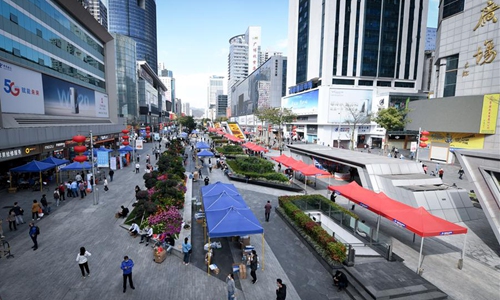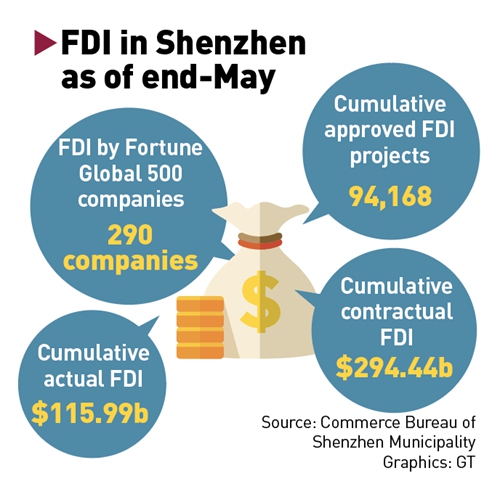Foreign firms marvel at Shenzhen's rise
By Zhang Dan and Chu Daye Source: Global Times Published: 2020/8/24 23:08:41
Opportunities abound after 40 years of reform, opening-up

Photo shows the Huaqiangbei commercial area in Shenzhen, south China's Guangdong Province. (Xinhua/Mao Siqian)
Foreign companies that have witnessed China's reform and opening-up firsthand in Shenzhen, the pioneering city in South China's Guangdong Province, said that their businesses flourished in the Chinese market as Shenzhen underwent tremendous transformation over the past four decades, and they are eager to participate in the city's next chapter as its openness and inclusiveness remain unchanged.
This Wednesday marks the 40th anniversary of the city becoming one of the nation's first special economic zones. During this time, the city climbed from the bottom of the manufacturing industrial chain to the forefront of global technological innovation.
Its GDP expanded over 10,000 times, and it surpassed China's Hong Kong Special Administrative Region and Singapore in terms of economic output.
"From accepting orders from Europe and the US that were transported via Hong Kong and Macao, to manufacturing products developed by domestic enterprises, Shenzhen's success lies in a model of 'small government, big society' - which allows the market instead of the government to play a bigger role in resource allocation," Xu Hongcai, deputy director of the Economic Policy Commission at the China Association of Policy Science, told the Global Times on Monday.

Shenzhen's fast expansion has meant not only more and better business for foreign companies in China, but the opportunity to grow together.
"The development of McDonald's in Shenzhen has been greatly supported by the local government, which provides significant opportunities to McDonald's growth in China - the vast market, passionate customers, high-quality talent and a rapidly changing socio-technical environment," McDonald's told the Global Times in a statement on Monday.
McDonald's opened its first Chinese mainland store in Shenzhen in 1990. Now the fast-food chain has more than 220 restaurants in the city alone.
"The most noticeable change is the city's infrastructure. The whole skyline is different now. There are more high-rise buildings, more convenient subways, more shopping centers and so on today than eight years ago," said John Burger, vice president of Hilton for greater China and Mongolia, who came to Shenzhen in 2012, calling the city one of the most vibrant areas in China.
With the evolving Chinese customer base and increasing market demand, Burger told the Global Times that Hilton will open a corporate office in the city in September to reinforce Shenzhen as one of Hilton's key strategic markets. The hotel giant sees opportunities in South China, especially with the fast development of Shenzhen and the potential of the Greater Bay Area.
482
"Shenzhen has always been at the forefront of China's opening-up and witnessed many important milestones in China's development in the past 40 years," Citi's Shenzhen branch told the Global Times on Monday.
Citi established its first branch in Shenzhen in 1983, and it has since actively participated in the development of the city.
The Shenzhen government has placed high importance on transforming government functions to foster a better business environment and energize all market players, the US bank said, noting that the efforts will be crucial in further advancing the city's economic development.
Xiao Feng, founder of Shenzhen Yidatong Enterprise Service, said only Shenzhen could have given birth to his enterprise, as the city is where supply meets demand.
"Moreover, the city's innovative approach to governance makes it possible for new business models like ours to grow," Xiao told the Global Times on Monday.
Xiao, who started Yidatong in 2001 to serve China's rising echelon of exporters with streamlined custom clearance and financial services, said Shenzhen's policy innovation, China's accession to the WTO, and the changing landscape of global trade made the success of his company possible.
Yidatong was acquired by Chinese e-commerce giant Alibaba in 2010.
Today, Shenzhen is home to China's homegrown champions, including eight Global 500 companies such as Ping An Insurance, Huawei, China Merchants Bank and Tencent.
Citing the rapid growth of Shenzhen-based Tencent and Huawei, Xu noted their transformation and upgrading have been achieved via their own innovation, large investment in research and development, and a favorable business climate.
"Most foreign enterprises have yielded their dominant positions in Shenzhen over the past decades to rising technology giants from the Chinese mainland, and this process shows how Shenzhen became an innovation hub," Tian Yun, vice director of the Beijing Economic Operation Association, told the Global Times on Monday.
More importantly, Tian noted these companies, such as Huawei and DJI, have become pioneers in their industries, which belong to the high-end technology sector, instead of followers of foreign enterprises as in the past, and this trend is the future for Shenzhen.
Today, Shenzhen citizens who've made money by doing business in e-commerce with Alibaba are staying at Hilton Hotels and eating at McDonald's, and they foot the bills via Tencent's WeChat Payment.
Looking further ahead, Tian said the city will make more innovations in finance and increase its attraction in the sector within the Guangdong-Hong Kong-Macao Greater Bay Area so as to further open up, calling for more favorable policies and supporting facilities for experts and their families.
"The economy is vibrant in Shenzhen with the digital industry in a leading position," Burger added. "The local government is also evolving. It is proactive and listens to us more, and it provides more support to foreign companies."
As of May, Hilton had seven hotels in Shenzhen and 255 in the Chinese mainland, hoping the unique location and economic position of Shenzhen will enable it to connect closely with its owners, corporate clients and markets, and to seize opportunities.
McDonald's has similar visions. The fast food giant hopes to get on the "express track" of the Guangdong-Hong Kong-Macao Greater Bay Area's development and follow the development of the Shenzhen demonstration pilot zone, vowing to increase investment and expecting to open more than 60 new outlets in the city by 2022.
Posted in: ECONOMY